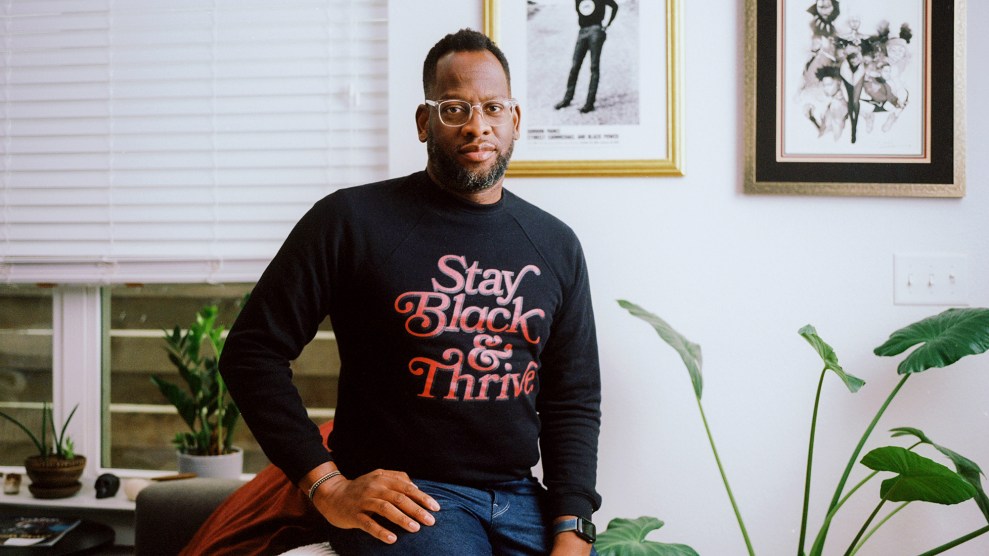New Under the Sun
Is it a quagmire? Is it like Vietnam? Or is Iraq a mess all its own?
‘Sexual Chaos’
The Texas ban on sodomy is struck down, and the Right predicts a moral armageddon.
Not-So-Smart Filters
Anti-porn filters block All Live Nude … as well as sites on breast cancer and Canadian fishing lodges. All to help children.
New Under the Sun
Number of hits a Google news search for the words “Iraq” and “Quagmire” received:
201.
Number of hits for the words “Iraq” and “Vietnam”:
2,380.
It’s official. The “Q” word — quagmire — is back. And this time it’s brought a friend: Vietnam, the “V” word. At least that’s how a growing number of left-leaning pundits see the increasingly bloody situation on the ground in Iraq.
Even though John Pilger, one of the left’s elder statesmen, is wary of comparing Iraq to Vietnam, he can’t help himself from noting certain similarities :
“Comparisons with Vietnam have been made so often over the years that I hesitate to draw another. However, the similarities are striking: for example, the return of expressions such as ‘sucked into a quagmire’. This suggests, once again, that the Americans are victims, not invaders: the approved Hollywood version when a rapacious adventure goes wrong … The Americans call the guerrillas ‘Saddam loyalists’ and ‘Ba’athist fighters’, in the same way they used to dismiss the Vietnamese as ‘communists’.”
On Tom Paine.com, Howard Zinn offers up a list of the ways in which Iraq differs from Vietnam. And yet, he adds, there are undeniable parallels. America may have exorcised its Vietnam-era ghosts in 1991, as the elder George Bush so famously declared, but the motivations that led us into Indochina — and now Iraq — haven’t changed a bit.
“But is the ‘Vietnam syndrome’ really gone from the national consciousness? Is there not a fundamental similarity — that in both instances we see the most powerful country in the world sending its armies, ships and planes halfway around the world to invade and bomb a small country for reasons which become harder and harder to justify?
The justifications were created, in both situations, by lying to the American public.
…
Both a Communist Vietnam and an Iraq ruled by Saddam Hussein were presented as imminent threats to American national security. There was no solid basis for this fear in either case; indeed Iraq was a country devastated by two wars and 10 years of sanctions, but the claim was useful for an administration bringing its people into a deadly war.What was not talked about publicly at the time of the Vietnam War was something said secretly in intra-governmental memoranda — that the interest of the United States in Southeast Asia was not the establishment of democracy, but the protection of access to the oil, tin and rubber of that region. In the Iraqi case, the obvious crucial role of oil in U.S. policy has been whisked out of sight, lest it reveal less than noble motives in the drive to war.”
In AlterNet, Jim Lobe notes that military analysts are comparing the nascent Iraqi resistance to the Palestinian Intifada. And the Asia Times‘ Pepe Escobar has yet another model: Afghanistan.
“Iraq is a perfect replay of Afghanistan. In both cases there was no mass capitulation, but a sort of strategic retreat. The Taliban did not surrender: they retreated from Kandahar with most of their weapons intact. Saddam’s Ba’athist regime also did not surrender: it retreated from Baghdad with many of its best weapons intact.
To understand what is happening in Iraq, it is instructive to listen to Mohammed Hasan, an Afro-Arab specialist on the Middle East based in Belgium. Hasan correctly assesses that today ‘there are two governments in Iraq. One of them controls the country by day, by the occupation and the military and psychological terror it seeks to impose. But it does not know what is really happening.'”
To be sure, there are real similarities in all the historical precedents. But as the country fries in the summer heat, with basics like water and electricity still unavailable and the insurgency worsening by the day, the occupation of Iraq is rapidly carving out its own unique place in the annals of disastrous military adventures. In the last two days alone, two US soldiers and one marine were killed in ambushes, while two more were abducted north of Baghdad. And in the first significant action against the occupation in southern Iraq, a Shi’ite mob killed six British soldiers on Tuesday. Meanwhile, persistent pipeline sabotage — there have been six explosions in the last two weeks — has hampered the restoration of Iraq’s crippled oil industry.
It’s not as if nobody in the administration is aware of the situation. Timothy Carney, the former US ambassador who until recently had been running Iraq’s Industry Ministry, had harsh words for the postwar planners.
“‘Those military officers simply did not understand or give enough priority to the transition from their military mission to the political military mission,’ added Carney, who had been working with the Office of Reconstruction and Humanitarian Assistance (ORHA) in Iraq.
Asked whether the White House had thought through the post-conflict situation, he answered: ‘Clearly not. I’m not aware of any discussion of post-conflict Iraq taking place before November or December of last year.'”
So never mind the historical antecedents. Never mind the “Q” word. Iraq is its own special mess. The title of Escobar’s latest column offers a good enough summation: “Hell Starts Now.”
‘Sexual Chaos’
The Supreme Court’s 6-3 ruling to repeal a Texas ban on homosexual sodomy sparked a wave of celebration in the LGBTQ (Queer) community, and a horror-stricken outpouring of commentary from the right.
The court’s decision acknowledges that consenting adults have the right to conduct their sexual lives behind closed doors. As Justice Anthony Kennedy wrote for the majority in the 6-3 decision, gay people “are entitled to respect for their private lives,” and that “the state cannot demean their existence or control their destiny by making their private sexual conduct a crime.” Bans on same sex sodomy in four states (Texas, Kansas, Oklahoma, and Missouri), as well as nine others banning sodomy for everyone, are now invalidated by the high court’s ruling.
The ruling prompted outrage from conservatives, who fear that the court’s ruling undermines “the right of states to enact laws in defense of public morals,” according to Ken Connor of the Family Researtch Council. The ruling is a harbinger of the downfall of society, warns Focus on the Family’s Vice President Tom Minnery:
“While it may feel good to some that a stigma is lifted from a particular group, something else has been lifted — the boundaries that prevent sexual chaos in our culture.”
Chaos, and even the threat of a kind of sexual armageddon. Connor writes that the ruling “throws the door open to any sexual behavior.” But worst of all, he warns, “The radical homosexual lobby will seek to apply the logic, extending a blanket privacy protection over one’s choice of sexual partner to one’s choice of marital partner as well — regardless of sex.” In other words, the Right fears that rescinding the ban could bring same-sex partners’ access to the economic and social benefits of marriage. God forbid.
Long a pipe dream of the queer community, gay marriage may be more than the Right’s paranoia. Even Justice Antonin Scalia, who voted to uphold the ban, commented on the potential for an eventual recognition of same-sex marriage:
“If moral disapprobation of homosexual conduct is ‘no legitimate state interest’ for purposes of proscribing that conduct; and if, as the Court coos (casting aside all pretense at neutrality) ‘when sexuality finds overt expression in intimate conduct with another person, the conduct can be but one element in a personal bond that is more enduring’; what justification could there possibly be for denying the benefits of marriage to homosexual couples exercising ‘the liberty protected under the Constitution’?”
That’s a damn good question, your honor. Perhaps anticipating it, conservatives are now out to change the Constitution so that it does explicitly prevent same-sex marriage. According to Ann Roves of PlanetOut.com, 37 states have already passed “Defense of Marriage” Act, and the House of Representatives will review an amendment entitled the “Federal Marriage Amendment,” all of which specify that marriage is only legal when its between a man and a woman.
Such legislation may seem feasible, especially under a conservative court and even more conservative administration. But a constitutional amendment prohibiting gay marriage was defeated last year. Turns out, the general public’s view of same-sex couples is relatively benign. A Gallup poll found that 60 percent of Americans believe that homosexual acts between consenting adults should be legal, reports Laura Billings of St.Paul’s Pioneer Press. And 88 percent think gays should be given equal opportunity provisions in the workplace. Middle America seems prepared for, if not necessarily excited about, same-sex marriage, Billings writes:
“Gay unions may be a hot-button issue in politics, but they are increasingly ho-hum to the rest of us.”
Andrew Sullivan’s two cents, in response to Justice Scalia’s questions and the right’s desires to “uphold morality,” defended an embattled minority:
“[W]hen ‘morality’ is simply a rubric under which to persecute a minority, then we don’t really have the imposition of morality at all. We have the imposition of a prejudice.
…
Equality under the law means something. And now, it inescapably means the right to marry – for all citizens and not just those with power.”
But perhaps it’s still not that simple, as Edward Lazarus of Findlaw explains. The Court’s ruling on the Texas sodomy case, as well as its recent ruling regarding affirmative action, are far more complex legally than their triumphant proponents imagine. A conservative court can rule in favor of something seemingly liberal, he writes, but the categorization of the rulings, how they can be challenged, and who they actually protect differ severely from their face value:
“Purely result-oriented liberals may not care, for they like the results of both the Michigan law school case, and Romer, and probably will like the Lawrence result, too. But pretenses like these can be toxic.”
Lazarus fears that the court’s movement away from its strict categorization of which laws protect which people means that “judicial decision-making is just political decision-making dressed up in the fancy garb of precedents and legal jargon.”
Lazarus raises important questions. But for now, the ban on sodomy was overturned and the Michigan law school can keep affirmative action. In these times, that probably counts as at least minor cause for some liberals to celebrate.
Not-So-Smart Filters
Looking for info on your next beach vacation? The public libraries may no longer be the place to go …
Amidst a slew of decisions, the Supreme Court ruled 6-3 on Monday to uphold the Children’s Internet Protection Act. The act requires public libraries that receive federal funding to install anti-pornography filtering software, or lose their federal funding. But because internet filtering software is still far from perfect, the act could severely limit young people’s access to information on reproductive health services.
The internet filtering software that’s being pushed by the right is a long way from having worked out its kinks — in fact, the attorneys for the ALA claim that it’s rather clumsy and ineffective. The Los Angeles Times’ David G. Savage reports:
“Lawyers for the American Library Assn. contended that the software filters were clumsy and ineffective. They said thousands of Web sites would be blocked.
Sometimes, the reason was apparent. For example, a Web site that dealt with breast cancer was blocked because of its subject matter. Sometimes, travel sites that portrayed suntanned bodies by swimming pools were blocked as obscene by filters that react to photos of human flesh.
In some instances, the reason for the blocks remained a mystery. For example, one filter blocked the home page of a Canadian hunting and fishing club.”
But the right continue to tout CIPA as a useful tool in preventing youth from viewing the naughty bits. Furthermore, claims the Weekly Standard’s Claudia Winkley in her article, “Liberal Perversity, ” perverse lefties have sunk so low as to lobby for adults who wish to view pornography at the library:
“THEY’VE DONE IT AGAIN. This time liberals have backed themselves into the position of defending library patrons’ right to view pornography at federal expense.
…
It calls to mind the late Michael Kelly’s deadly dart, that sometimes it seems as if ‘liberalism’s animating impulse is to marginalize itself and then to enjoy its own company. And to make itself as unattractive to as many as possible: If it were a person, it would pierce its tongue.'”
(If the left is a person with a pierced tongue, is the right a person with a paper bag over his head?)
Winkler further opines that proponents of free-speech advocacy or “1st amendment absolutism” as she likes to call it, have nothing to fear. She points out Justice Rehnquist’s statement to the court that “libraries have the capacity to permanently unblock any erroneously blocked site.”
But as Chicago Tribunes Jan Crawford Greenburg points out, disabling the filters — which may not be available to smaller libraries — can take days. Not to mention the fact that the only sites that will be unblocked are those that will be used for “bona fide research”:
“Moreover, as dissenting justices made clear, the law does not require libraries to turn off filters on request, despite the suggestions of Kennedy and Breyer. The law provides that the filters can be disabled only for ‘bona fide research or other lawful purposes.’
Justice David Souter, in a dissent joined by Justice Ruth Bader Ginsburg, said unblocking Web sites for adult use could take days or may be unavailable in smaller branch libraries that are not as well-staffed as main libraries. Souter said the filtering requirement, which limits access, was the same as if a library were ‘buying an encyclopedia and then cutting out pages with anything thought to be unsuitable for all adults.'”
Youth (and possibly adults) who don’t have computers used to be able to make a trip to their local library and receive fast and easy information about pregnancy, contraception, and STD’s such as AIDS. The Journal of the American Medical Association released a report last year citing that in a study of internet pornography filters, 10 percent of health sites using terms such as “safe sex,” “condoms,” “homosexuality,” and “gay” were blocked.
So where does that leave the youth? According to the Intelligencer, CIPA harms lower-income youth, who already have limited access to healthcare, by blocking them from readily accessible information about reproductive/sexual health services and information:
“It is entirely conceivable, then, that someone with a need to learn the facts about, say, AIDS, may find that the library computer will not access necessary Internet sites. As critics of the law have noted, many adults will be too embarrassed to ask librarians to disable blocking software.
And, it needs to be pointed out that in that regard, the ban will strike disproportionately at low-income Americans who rely on libraries for Internet access because they cannot afford computers at home.”















